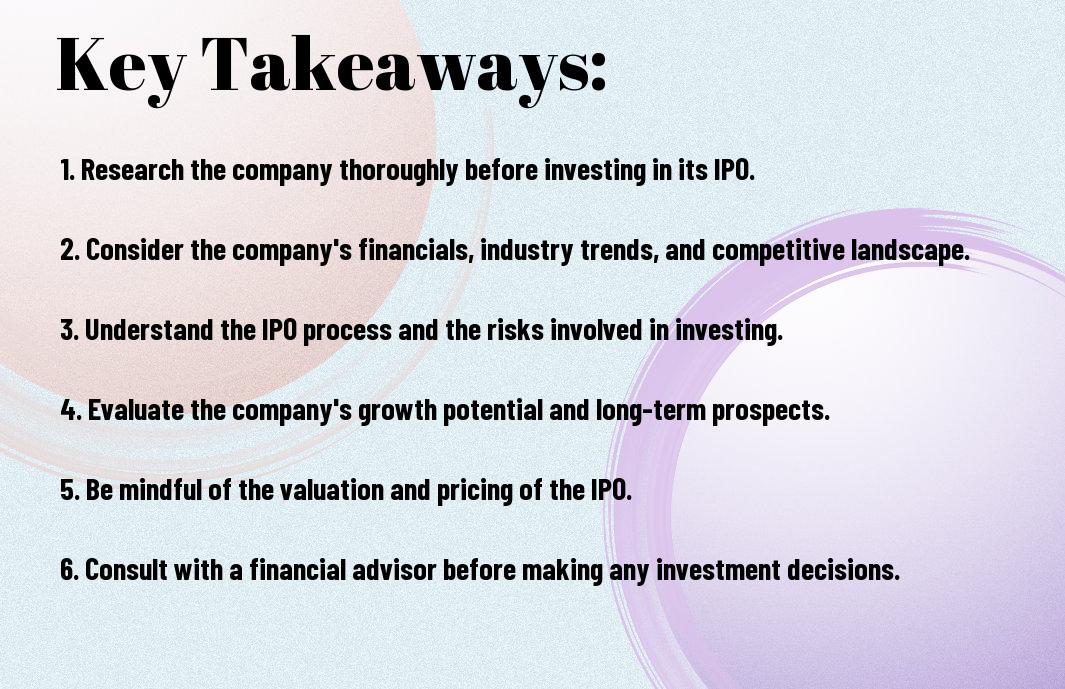Congratulations on your decision to explore the world of investing in the Indian stock market! Initial public offerings, or IPOs, can be an exciting and potentially lucrative opportunity for you as a beginner investor. However, it’s important to approach IPOs with caution and a thorough understanding of the risks involved. In this guide, we will walk you through the basics of investing in IPOs in the Indian stock market, including the potential benefits and pitfalls. By the end of this article, you will have a clear understanding of how to navigate the world of IPO investing and make informed decisions that align with your financial goals. Let’s get started!
Key Takeaways:
- Understanding the IPO process: It’s essential for beginners to grasp the IPO process, including the pre-IPO phase, the offering price, and the allocation process.
- Risks and rewards: Investing in IPOs can be lucrative, but it’s critical to be aware of the risks involved, such as market volatility and potential overvaluation.
- Due diligence is crucial: Before investing in an IPO, beginners should conduct thorough research on the company’s financials, management team, and industry position to make informed decisions.

Understanding the Indian Stock Market for IPOs
Obviously, before diving into investing in IPOs in the Indian stock market, it’s crucial to have a good understanding of how the market operates. This includes knowing the structure of the market, the key regulatory bodies that oversee it, and the processes involved in buying and selling stocks. This chapter will provide you with an overview of the Indian stock market, enabling you to make informed decisions when considering IPO investments.
Structure of the Indian Stock Market
The Indian stock market is a vast and complex system comprising of several stock exchanges, with the Bombay Stock Exchange (BSE) and the National Stock Exchange (NSE) being the two major ones. Both exchanges operate electronically, providing a platform for trading in various financial instruments including equities, derivatives, and commodities. The stock market is also categorized into two segments – the primary market, where new securities are issued and the secondary market, where existing securities are traded.
Key Regulatory Bodies
When considering investing in IPOs in the Indian stock market, it’s crucial to be aware of the key regulatory bodies that oversee the functioning of the market. The Securities and Exchange Board of India (SEBI) is the primary regulatory authority responsible for regulating the securities market in India. It ensures fair and transparent dealings in the market while protecting the interests of investors. Additionally, the Reserve Bank of India (RBI) and the Ministry of Finance play significant roles in governing the financial and economic aspects of the market.
The IPO Process in India
Despite the risks involved, investing in IPOs can be a rewarding venture if done correctly. Understanding the process is crucial before diving in. It is important to familiarize yourself with the guidelines for beginners investing in IPOs. You can find more information on this at Guidelines For Beginners Investing in IPO.
Steps in an IPO
When a company decides to go public and issue an IPO, there are several key steps that take place. Firstly, the company appoints an underwriter to handle the IPO. The underwriter helps the company determine the IPO price and brings the IPO to market. The company then files a draft offer document with the Securities and Exchange Board of India (SEBI) and once approved, the company can start promoting the IPO to potential investors. During the IPO, investors can place orders for shares through the book-building process or through the fixed price method. After the IPO subscription period ends, the company allocates shares to investors and lists the IPO on the stock exchange for trading.
How to Apply for IPOs
Applying for an IPO in India is a relatively straightforward process. You can apply for an IPO through your stockbroker using ASBA (Applications Supported by Blocked Amount) or through the net-banking facility of your bank. You will need to have a Demat account and a PAN card to apply for an IPO. Once you have successfully applied for an IPO, the amount equivalent to the IPO shares you have applied for will be blocked in your bank account. If your application is successful, the shares will be credited to your Demat account. If not, the blocked amount will be unblocked.
It is crucial to carefully consider your investment goals and risk tolerance before investing in IPOs. While there can be significant potential for growth, IPO investing also comes with inherent risks. It is important to thoroughly research and analyze the company’s financials, management team, and market potential before considering an investment. Understanding the IPO process and the steps involved can help you make informed decisions when investing in IPOs.

Key Considerations When Investing in IPOs
Now that you understand the basics of IPOs, it’s important to consider some key factors when deciding to invest in an IPO in the Indian Stock Market. It’s crucial to make informed decisions to maximize your chances of success in this high-risk, high-reward venture.
Assessing a Company’s Value
When considering investing in an IPO, it’s essential to assess the company’s value. Look at the company’s financial statements, including its revenue, earnings, and cash flow. Additionally, analyze the company’s business model, management team, and competitive advantage to determine if it has a sustainable business that can generate long-term value for its shareholders. Understanding the company’s value will help you make an informed decision about whether the IPO is a sound investment for you.
Risk Factors and Return Potential
When evaluating an IPO, you must consider the risk factors and return potential associated with the investment. Consider the industry in which the company operates and the macroeconomic factors that could affect its performance. Analyze the company’s growth prospects and whether it has a sustainable competitive advantage. Additionally, consider the company’s track record and its potential for future growth. It’s essential to weigh the potential return against the potential risks before making your investment decision. After all, the goal is to maximize your returns while minimizing your risks.
- Risk factors: Industry competition, economic volatility, regulatory changes
- Return potential: Strong growth prospects, unique market position, experienced management team
Strategies for Successful IPO Investments
Your strategies for successful IPO investments can greatly impact your overall success in the Indian stock market. By carefully considering various factors and implementing smart investment tactics, you can increase your chances of profiting from IPOs.
Timing the Market
Timing the market is crucial when it comes to IPO investments. You need to carefully evaluate the market conditions and the company’s financial performance before jumping in. Investing in an IPO during a bull market can be tempting, as the overall market sentiment is positive and new companies are often met with enthusiasm. However, it’s important to conduct thorough research and not get swept away by the hype. On the other hand, investing during a bear market may seem risky, but it can also present attractive opportunities to buy stocks at lower prices. Keep a close eye on market trends and consider seeking advice from financial experts to gauge the best time to invest in an IPO.
Portfolio Diversification
Diversifying your investment portfolio is a key strategy for successful IPO investments. By spreading your investments across different sectors and industries, you can mitigate risk and increase the potential for higher returns. When considering an IPO, evaluate how it fits into your existing portfolio and be mindful of putting too much emphasis on a single stock. Diversification allows you to protect your investments from the volatility of any one particular market segment, while also capturing the growth potential of multiple sectors.
To wrap up
Investing in IPOs in the Indian Stock Market can be a lucrative opportunity for you as a beginner investor. By understanding the process of IPOs, conducting thorough research, and considering the long-term potential of a company, you can make informed decisions and potentially earn significant returns. As with any investment, there are inherent risks involved, so it is crucial to educate yourself, seek professional advice, and diversify your portfolio to mitigate potential losses. With the right knowledge and approach, investing in IPOs can be a valuable addition to your investment strategy in the Indian Stock Market.
FAQ
Q: What is an IPO in the Indian Stock Market?
A: An Initial Public Offering (IPO) is the process through which a privately held company offers shares to the public for the first time. It allows companies to raise capital by selling their shares to investors and list them on the stock exchange.
Q: How can a beginner invest in IPOs in the Indian Stock Market?
A: To invest in IPOs in the Indian Stock Market, beginners can open a Demat and trading account with a registered stockbroker. They can then apply for IPO shares through their bank’s net banking platform or through the stockbroker’s website using the UPI payment method. It is essential to conduct thorough research on the company’s financials, management, and future prospects before investing.
Q: What are the risks associated with investing in IPOs in the Indian Stock Market?
A: Investing in IPOs comes with its own set of risks. Some of these risks include market volatility, the company’s ability to sustain growth, and potential overvaluation of the IPO shares. It is important for beginners to carefully evaluate the risks and make an informed decision before investing in IPOs. Seeking advice from a financial advisor can also help in managing these risks effectively.

